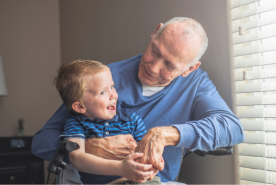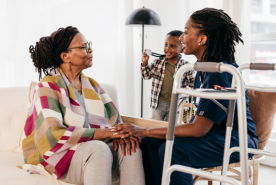June 27, 2024
Trigger warning: This article discusses suicidal ideation and suicide. If you or someone you know is contemplating suicide, call the National Suicide Prevention Lifeline at 1-800-273-8255 or visit the National Suicide Prevention Lifeline for more resources.
Discrimination and barriers to healthcare can create challenges for LGBTQIA+ individuals that make it harder to maintain good health.
Civil rights advocate and living kidney donor Brian Sims, along with kidney recipient and activist Dr. Josh Wilder, discuss the impact of these challenges and offer advice on maintaining a positive outlook while getting the healthcare you deserve.
LGBTQIA+ Communities and Kidney Disease
One in three adults in the United States is at risk of kidney disease. For many in the LGBTQ+ community, the risk is even higher. Why? Social determinants of health or the non-medical factors that make it more difficult to live a healthy lifestyle and get quality healthcare.
A recent study found that adults in the LGBTQIA+ community face more discrimination in their daily lives and healthcare settings than non-LGBTQIA+ individuals.1 With over 500 anti-LGBTQIA+ bills introduced in the first half of 2024, this discrimination is likely to get worse.
"This is a coordinated attack, largely against trans healthcare and freedom of speech, using scare tactics that have zero basis in reality," said Sims. "Stopping youth's access to healthcare, ability to make decisions for themselves with their family, and play sports or use a restroom is as much about attacking our future as it is robbing us of bodily autonomy. The ability to decide what is right for ourselves is fundamental."
While these attacks may not be based in reality, the consequences of them are.
The Trevor Project's 2024 Survey2 found that:
- More than 90% of LGBTQ+ youth feel their well-being has been negatively impacted by recent political decisions.
- 39% of LGBTQ+ youth seriously considered attempting suicide. These rates were highest in LGBTQ+ youth of color.
- More than 1 in 10 LGBTQ+ youth attempted suicide in the past year.
Adult LGBTQIA+ individuals are also more likely to experience mental health issues like depression or thoughts of suicide and use substances as a means to cope.3
Without proper treatment, these mental health challenges can make it more difficult to make healthy life choices. It also increases the risk for diabetes and heart disease, risk factors for kidney disease.4
Since kidney disease doesn't usually show symptoms until the later stages, preventative care and check-ups are crucial. Unfortunately, LGBTQIA+ adults are twice as likely to report a negative experience with a healthcare provider, which decreases the likelihood of seeking care. Black and Hispanic LGBTQIA+ adults are twice as likely as their White counterparts to experience mistreatment within the healthcare system.1
"Many in the LGBTQI+ community, especially LGBTQIA+ people of color who experience an additional layer of discrimination, feel that their medical provider doesn't see them deserving of healthcare," Dr. Wilder said. "These issues and more, prevent people from seeking the care they need to stay healthy and prevent chronic health conditions."
Are you at risk of kidney disease? Take this one-minute quiz to find out.
Moving Forward with Pride
While there are challenges facing the LGBTQIA+ community, many that Sims and Dr. Wilder have faced, they don't want people to give up hope.
"Growing up as a Black, gay man with a chronic illness, I felt less than–especially in healthcare settings. I was treated differently," Dr. Wilder said. "It inspired me to go to medical school and make a difference in a space where people of color aren't generally afforded the same socio-economic opportunities as others. I hope to inspire more people of color and LGBTQIA+ individuals to join the medical field. Change starts from within."
The same desire for change led Sims, the first openly gay person elected to the PA's General Assembly in the House of Representatives, to politics.
"I'm a cis-gendered white man, and I'm gay. Sharing my identity had a real impact on the people around me and within the legislation," Sims said. "As a white man in a culture that affords me extra privilege, it's on me to use those privileges to make a change. I've spent my career in civil rights not because I was wronged as a queer person, but because we all need to do our part to stop inequalities."
Dr. Wilder echoes this sentiment: "Pride means unity. We need to continue working together to show the younger members of the LGBTQIA+ community how far we've come and provide hope for the future."
Want to help better policies for people at risk of or living with kidney disease? Become a Voices for Kidney Health advocate today. Your voice makes all the difference.
Standing Up for Yourself and Others
Everyone deserves consistent quality healthcare without bias.
"If your provider isn't treating you with the dignity and the respect you deserve, go somewhere else," Sims said. "You are ultimately in control of advocating for yourself and your healthcare. Seek out providers who see and treat you as a person."
Even if it takes time to find, there are many providers out there who are members of the LGBTQIA+ community or allies.
"Outhealthcare.org allows people to find specific healthcare in their state from inclusive and affirming practitioners. Don't settle. Switching may be annoying but it is as easy as having your records transferred from one office to another," Dr. Wilder said. "You can find community or assistance through LGBTQIA+ organizations, advocacy groups, or even some gay bars."
For LGBTQIA+ allies, showing support can be as simple as:
- Having external signs of support like having a pride flag or pronoun pins
- Not assuming someone's gender or sexuality and using more gender-neutral terms like "partners" as opposed to "husband and wife."
- Shopping at LGBTQIA+-owned businesses.
“We talk a lot about what not to do, like microaggressions or the ways people show casual racism or homophobia. It’s also important to talk about what we can do,” Sims said. “We need our allies to stand up for LGBTQIA+ equality. Even little acts like showing outward signs of support and inclusivity can make a difference.”
Feeling inspired? Join National Kidney Foundation’s fight for a fairer future–one where everyone has access to the best healthcare possible. Sign NKF's KIDNEY EQUITY FOR ALL™ Bill of Rights.
Sources
1Alex Montero, Liz Hamel, and Apr 2024. “LGBT Adults’ Experiences with Discrimination and Health Care Disparities: Findings from the KFF Survey of Racism, Discrimination, and Health.” KFF, 7 May 2024, www.kff.org/racial-equity-and-health-policy/poll-finding/lgbt-adults-experiences-with-discrimination-and-health-care-disparities-findings-from-the-kff-survey-of-racism-discrimination-and-health/.
2Nath, R., Matthews, D.D., DeChants, J.P., Hobaica, S., Clark, C.M., Taylor, A.B., Muñoz, G. (2024). 2024 U.S. National Survey on the Mental Health of LGBTQ+ Young People. West Hollywood, California: The Trevor Project. www.thetrevorproject.org/survey-2024
3“Samhsa Releases New Data on Lesbian, Gay and Bisexual Behavioral Health.” SAMHSA, 13 June 2023,www.samhsa.gov/newsroom/press-announcements/20230613/samhsa-releases-new-data-lesbian-gay-bisexual-behavioral-health.
4“About Mental Health.” Centers for Disease Control and Prevention, Centers for Disease Control and Prevention, 16 Apr. 2024, www.cdc.gov/mentalhealth/learn/index.htm.














